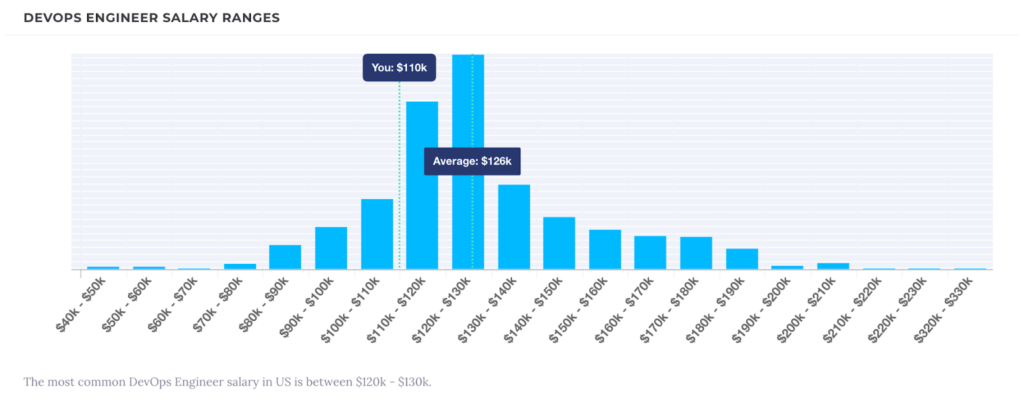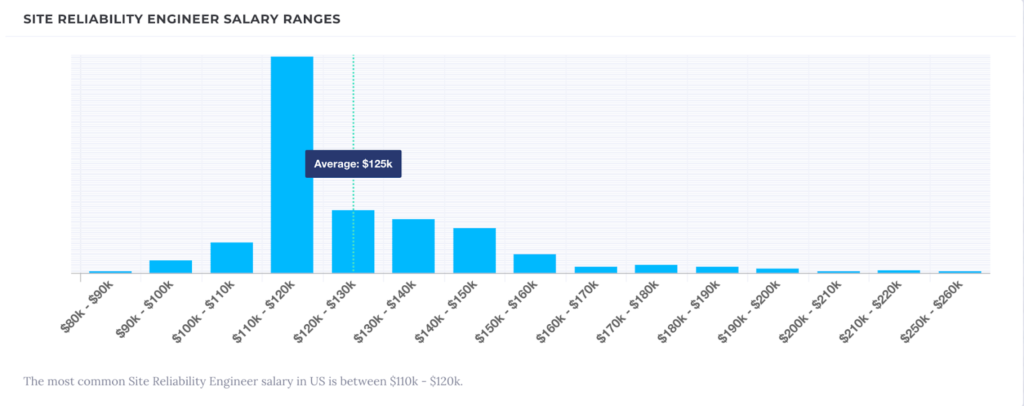Have you been looking at job postings recently? Then you may come across jobs like DevOps Engineer and Site Reliability Engineer. When you look at the job descriptions, the two jobs seem identical! They both work in cloud computing, and they also achieve similar goals. Are they really identical, though? Short answer: no.
Both roles serve distinct responsibilities, and I’ll go over them with you in this article. I’ll also show you exactly what the two roles are, what skills they need, and how much they pay. First, though, I’ll show you why the roles are similar.

DevOps Engineer and Site Reliability Engineer: The Similarities
As the application deployment gets more complicated, companies need reliable, scalable software. That’s also where DevOps and Site Reliability Engineers (SRE) come into play.
DevOps engineers and SREs both:
- Improve product release cycles
- Build reliable software through automation
- Need collaboration and monitoring
Yet, that’s where their similarities end. These roles follow different approaches to achieve their goals, and they also have several differences in expectations and pay rates. To understand those better, I’ll walk you through each role separately.
What Does a DevOps Engineer Do?
A DevOps Engineer is a very broad title, and its roles and responsibilities can vary from company to company. In general, a DevOps engineer creates and maintains cloud-based infrastructure. They also use platforms like AWS, Azure, and Google Cloud, to name a few.
DevOps Engineers will also work with developers to automate manual processes and tasks. Automation also frees up the developers’ time and allows them to focus more on writing code and developing more features.
DevOps Engineer Responsibilities
The DevOps Engineer is going to provision cloud-based and on-prem-based infrastructure. Mainly, they automate processes to support continuous integration / continuous deployment (CI/CD) processes. CI/CD processes are at the core of the DevOps role.
DevOps Engineers will also generally support multiple application development teams and many applications. They’ll also usually write scripts to integrate databases and other software. They even create a tech stack which development teams work from.
DevOps Engineer Release and Deployment Responsibilities
DevOps Engineers will also deploy and release new versions of applications. They generally build out release pipelines that move all code to higher environments. This pipeline automation makes releases generally less time-consuming than moving all the code manually. Timers can also kick off the pipelines at a specified time. Then, the developers and product owners can join the release call to confirm the release was successful.
As far as responsibilities go, this is still just the tip of the iceberg. Each company is unique, and so are the responsibilities of the DevOps Engineers. That’s why they also need to have a wide set of skills, so they can adapt to their companies’ requirements.
DevOps Engineer Skill Set
Every DevOps Engineer will need in-depth knowledge of:
- Major DevOps platforms such as AWS, Microsoft Azure DevOps, Google Cloud
- Command Lines like Linux or PowerShell
- Major programming languages like C+, Java, TypeScript, or Python
- Virtualization Technologies like VMSphere
- Containerization technologies like Docker and Kubernetes
- Common serialized languages for integration and pipelines like YAML and JSON
- Communication and collaboration to manage many projects and work with different people
DevOps Engineer Downsides
The DevOps Engineer role is vast and includes many different technologies, but it’s difficult to stay on top of these changes to succeed.
DevOps Engineers also need to bridge teams and management. Yet, that’s also tricky. In fact, you need to understand the developer’s side, the QA side, the management side, and the business side. Lastly, the late-night releases may also be an issue. On the bright side, though, let me show you what it pays to be a DevOps Engineer!
DevOps Engineer Pay Scale
What would be your compensation as a DevOps Engineer? For the United States, the pay scale is broad, but it generally starts at around $110,000. It can also go all the way up to $330,000 (at the highest) at a major tech company like Apple, Google, Coinbase, etc. Keep in mind that your salary will also be higher if you’re a senior. On average, the annual salary is around $126,000.

I’ve shown you the DevOps Engineer’s role in detail. Now, let me tell you more about what the Site Reliability Engineer does.
What Does a Site Reliability Engineer Do?
A Site Reliability Engineer is another bridge between development and IT operations. SREs work with both development and IT departments to connect them.. An SRE is also going to use scripting to fix problems that occur.
A site reliability engineer also needs to be an expert coder so they can address all the operating issues they might encounter.
Site Reliability Engineer Responsibilities
First, SREs need to communicate between development and operations teams. They’ll also bridge the divide between the two. They should also be expert problem solvers. SREs automate processes to fix issues that appear in the applications. Via automation, SREs will also decrease the operation teams’ workload. That’s because automation will handle recurring problems.
Site Reliability Engineer Skill Set
An SRE will also need to:
- Know a major programming language such as Python, Ruby, Javascript, or PHP
- Understand one major cloud service such as AWS, Microsoft Azure DevOps, or Google Cloud
- Use various monitoring software such as DataDog, Prometheus, AppDynamics, etc
- Write scripts in Linux or PowerShell, so you automate solutions for recurring problems
- Communicate and collaborate across-teams. You’ll need to communicate with multiple teams over various applications
- Manage incidents and be available during off-hours to respond to incidents
SRE Downsides
The big downside of being an SRE is that you need to fix problems all the time. Most of your work is going to be fixing problems and finding automated solutions. Some people may love it, but others feel stressed when dealing with problem after problem. You also need to be ready for late-night releases. Clearly, it isn’t an easy job, so it also pays above average. Let me show you.
SRE Pay Scale
In the US, the SRE pay scale has a lower entry point than the DevOps Engineer. The scale starts at $80,000 and goes up to a high of $260,000. Yet, the median average is around $125,000, but it also depends on where you work. If you’re working for a massive, well-known tech giant, expect to be on the higher end of the scale. Conversely, if your company happens to be smaller, you’ll likely be on the lower end of the salary scale.

DevOps Engineer vs. SRE: Rundown
This may seem like a lot to think about, so I’ve neatly wrapped everything in this comparison table below!
| Skill | DevOps Engineer | Site Reliability Engineer |
| Programming Languages | C+, Java, TypeScript, or Python | Python, Ruby, Javascript, or PHP |
| Cloud Services Platform | AWS, Microsoft Azure DevOps, or Google Cloud | AWS, Microsoft Azure DevOps, or Google Cloud |
| Monitoring Apps | Good to know | DataDog, Prometheus, and AppDynamics |
| Automation Scripting | Yes | Yes |
| Communication and Cross-team | Yes, you need to work with Development, QA, Business, and management | Yes, usually just development |
| On-call | No, but some off-hours for releases | Yes |
| Virtualization and Containerization | Docker, Kubernetes | Always a benefit to know |
Final Thoughts
Having said all that, it pays to be an SRE or a DevOps Engineer. The roles are closely related, but SRE has more to do with coding and solving recurring issues. The SRE also usually has to be on call and work odd hours to quickly fix any production issues. Conversely, the DevOps Engineer works more of a 9-5 schedule, except on release nights. DevOps Engineers also need coding and scripting knowledge to fulfill their role. Either way, both roles are ultimately rewarding and fulfilling.
Do you still have more questions? Check out the FAQ and Resources section below for more information!
Get The Latest Tech Genix News
FAQ
What is DevOps?
DevOps is an application development method that uses CI/CD processes for incrementing software development. That also allows for a quicker pace than traditional methods. It combines development and operations to be agile and quickly deploy new code. It also typically employs DevOps Engineers to drive this process forward.
What is Cloud Computing?
The industry currently favors cloud computing because it allows cloud-based platforms to store code, servers, pipelines, databases, and virtual machines in the cloud, not on-premise. This also leads to massive cost savings and quicker time to market for development. DevOps and SRE play a role in cloud computing.
What is a Hybrid Model?
Hybrid models allow companies to use their on-prem servers with cloud computing platforms. This is also useful for companies that can’t migrate from on-prem to the cloud due to legacy software or data storage secrecy.
What are Monitoring Apps?
Monitoring apps monitor your tech stack and the applications that live within it. Monitoring your environment will also help you know when something goes wrong, so you can quickly act to fix the problem. This is also invaluable for client-facing production websites.
What is the Median Salary for a DevOps Engineer and an SRE?
The median salary for a DevOps Engineer is $126,000 per year, while the median salary for a Site Reliability Engineer is $125,000 per year. DevOps engineers have more upward mobility and higher earnings potential over time.
Resources
Skills that Every DevOps Engineer Needs in 2022
Learn more about the skill sets that DevOps Engineers need here.
Incident Management Startups that help you put out the fires
Explore new companies that help with incident management here.
The Evolution of Managed Kubernetes Containers: what lies ahead for 2022
Learn more about what’s coming this year for Kubernetes here.
Creating a PowerShell Script to Post Deployments Updates in Azure DevOps in AppDynamics
Learn more about how to customize the monitoring tool AppDyamics here.
Git Management: Why it’s Crucial to DevOps’ Success
Learn more about how Git integrates into DevOps Processes here.



